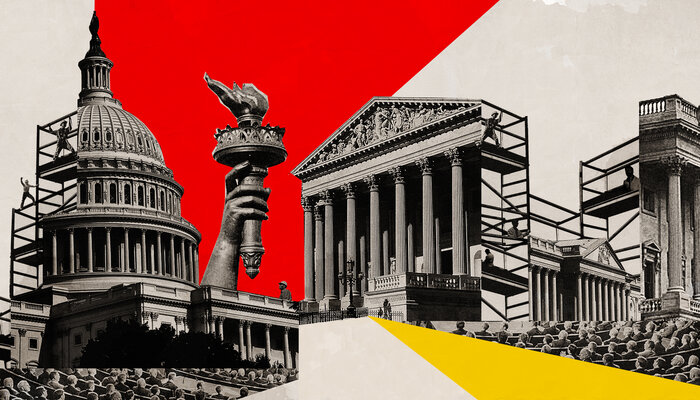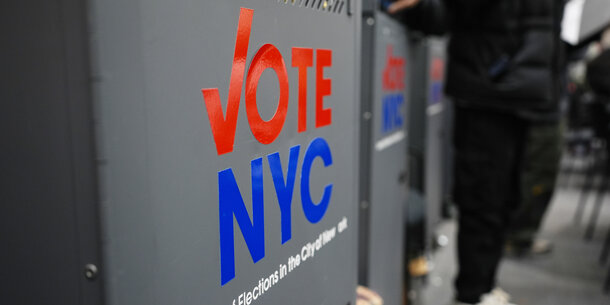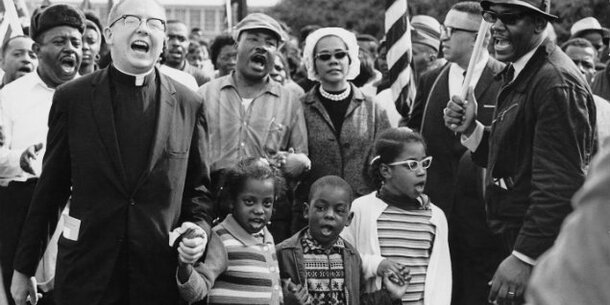The violent attack in the U.S. Capitol was an attack on American democracy. It was the culmination of efforts by President Trump and his allies to overturn the results of the November election, fueled by repeated lies about widespread voter fraud. Had they been successful, these efforts would have disenfranchised millions of Americans, especially targeting Black and brown voters.
While the insurrection failed to nullify the election, the United States nonetheless has faced years of mounting attempts to undermine fair and equal representation. Voter suppression efforts have become increasingly brazen, with recent laws in many states that make it unnecessarily hard to vote. Many Americans have grown disillusioned by a political system that undermines the will of voters through extreme gerrymandering and gives outsized influence to a tiny class of wealthy mega-donors. And the last four years have underscored the need for stronger guardrails that prevent abuses of presidential power. All of these dynamics point to the need for the comprehensive set of democracy reforms laid out in the For the People Act (H.R. 1 in the House of Representatives and S. 1 in the Senate), coupled with the John Lewis Voting Rights Advancement Act.
After the insurrection at the Capitol last week, how would you describe the state of American democracy?
Wendy Weiser: What happened last week was not just an attack on the Capitol; it was an attack on our democracy. This attack was spawned by repeated lies about voter fraud and thoroughly debunked conspiracy theories about the integrity of our election system that were designed to overturn the results of November’s presidential election. They were part of a broader illegitimate scheme to thwart to election, which included attempts to disenfranchise millions of Americans, targeting Black and brown voters. We need accountability for everyone who stoked and participated in this attack, but we also need stronger guardrails to strengthen our democracy to ensure that this can’t happen again in the future.
We just had a grueling election cycle that saw, on the one hand, unprecedented mobilization that led to historic voter turnout and, on the other, unprecedented efforts to thwart the electoral process and to disenfranchise voters of color. It should not take more than 300 lawsuits and massive amounts of organizing around the country just for people to have access to the ballot. But it did, because there isn’t a set of clear rules and procedures that ensure every eligible American has fair voting access.
And let’s be clear: this didn’t start in 2020. Even though President Trump has been driving this lie for more than four years, it did not start with him and it will not end with him. The effort to restrict access to voting, fueled by lies about voter fraud, has been going on for a decade, and it escalated in 2013 after the Supreme Court gutted the protections of the Voting Rights Act in Shelby County v. Holder. Self-interested state legislators have increased hurdles to voting and created gerrymandered electoral districts; some have gone so far as to undo the work of their citizens who voted to expand the franchise. In 2018, for example, Floridians voted overwhelmingly to restore voting rights to their fellow citizens with past felony convictions, only to have their state legislature significantly undercut the new law before those citizens could actually vote.
Unfortunately, there has been a growing movement among state legislators and other leaders who use underhanded tactics to keep eligible Americans from voting or to keep their votes from counting. The push to nullify the results of the 2020 election was the most blatant and shocking example, but it is part of a larger anti-democratic trend that we must thoroughly combat and root out. That is why comprehensive democracy reform is really necessary.
The United States is simultaneously experiencing public health, economic, racial justice, and climate crises. Amid all of this, why should lawmakers prioritize democracy reform?
Daniel I. Weiner: We can’t solve any of these major problems without fixing our democracy and ensuring that our government is actually responsive to the needs and priorities of the American people. People overwhelmingly want the critical problems we face addressed: climate change, gun violence, economic inequality — the list goes on. But it’s naïve to think that we can somehow tackle them when we have a political system that is struggling so much to translate the public’s will into government policy. Ultimately, democracy reform is the linchpin to achieving concrete progress in other areas — and to addressing the sense of disempowerment and alienation from our public institutions that has helped to drive so much distrust and extremism in our politics.
Voting is arguably the cornerstone of our democracy, and it is rightfully an integral part of the For the People Act. If enacted, how would the bill reform our voting system?
Weiser: One critical pillar of the For the People Act is focused on reforming our voting systems — both to counter voter suppression tactics and, more broadly, to make it easier for eligible voters to cast their ballots. Over the last 40 years, we’ve often relied on the federal courts as a critical backstop to guarantee voting rights. But while the current Court didn’t countenance an effort to overturn the election result, they have sent a very clear signal they’re not going to step in to vigorously protect voting rights. The Constitution expressly gives Congress the primary responsibility for guaranteeing baseline standards for access to the ballot in federal elections. Every eligible American should be able to rely on a basic level of voting access in federal elections no matter where they live and who serves in their state legislature. That is why voting reform is a pillar of the For the People Act. And of course, it’s not just this bill. The John Lewis Voting Rights Act, which is a critical companion to the For the People Act, would restore the full sweep of the Voting Rights Act of 1965 and undo the damage of the Supreme Court’s Shelby County decision.
As you mentioned, the For the People Act isn’t just a voting bill; it has provisions that address redistricting, campaign finance, and government ethics. How are all of these reforms related?
Weiner: To start, the For the People Act would prohibit extreme partisan gerrymandering and take a variety of other steps to make the redistricting process more transparent and accessible, including requiring congressional redistricting to be done by independent commissions. Extreme gerrymandering has gotten substantially worse over the last decade as technology has made it easier to draw gerrymandered districts with intense precision. I don’t think anyone believes that this problem will somehow vanish in the new redistricting cycle starting in 2021 unless Congress takes affirmative steps to rein it in (something even the more conservative members of the Supreme Court agree it has the power to do).
Another pillar of the For the People Act involves reform of our campaign finance system. The 2020 election was far and away the most expensive election in American history, and it continued a trend where the vast majority of political spending comes from a tiny coterie of people who are able to write checks in excess of $100,000 or even a million dollars. We know from extensive research that the people who fund campaigns wield enormous clout in our political system. The way we fund campaigns also poses special challenges for many candidates of color, especially women, who often lack the wealthy networks from which many white candidates benefit.
Additionally, the Supreme Court has been hostile to some types of campaign finance regulation, most notably in its much-reviled Citizens United decision. But there are actually many policies still on the table — including small donor public financing, which uses public funds to amplify small, private contributions so that candidates don’t need to rely on the wealthiest donors. We’ve had small donor public financing for presidential primaries since the 1970s. The For the People Act would revitalize that system and extend it to congressional races (using an innovative funding mechanism that doesn’t rely on taxpayer funds). And it contains a number of other critical reforms, including an overhaul of the Federal Election Commission, our dysfunctional federal campaign finance regulator.
The For the People Act also includes a suite of fairly ambitious ethics reforms. We needn’t belabor the point that there have been enormous ethical issues in the federal government over the last four years, many at the very top. Some of the For the People Act’s most significant provisions would apply basic ethical safeguards — ones that already apply to other federal officials — to the president and vice president. It would also take on many other longstanding problems that were uncovered over the past four years, such as the revolving door between industry and government, and the weak enforcement of federal ethics rules.
All of these issues are very much interconnected. That’s why we have a historic, comprehensive package of reforms that addresses all the main facets of the dysfunction that we see in our political system.
What are the potential paths toward passing and enacting the For the People Act?
Weiser: President-Elect Biden, Vice President Elect Harris, Speaker Pelosi, and incoming Senate Majority Leader Schumer have each listed democracy reform as one of their top priorities. We’re at a historic moment — unprecedented in the modern era — when the need for reforms to strengthen our democracy could not be more urgent, and when all the incoming government leaders are focused on democracy reform as a linchpin issue.
Ultimately, democracy reform shouldn’t be a partisan issue — and until pretty recently, it wasn’t. Virtually everything in the For the People Act is based on policy proposals that have won bipartisan support at the state level and, in some cases, even in Congress. The last time the Voting Rights Act was reauthorized, it had unanimous approval in the Senate and overwhelming support in the House; as recently as last session, measures to restore protections of the Voting Rights Act have achieved bipartisan support in Congress. In 2021, with Democrats controlling what makes it to the floor of the U.S. Senate, there’s an opening for some real good-faith negotiations. There’s an opportunity to pass a substantive, ambitious package of reforms, with or without changes to Senate rules. And regardless of what happens in this Congress, the momentum for democracy reform will continue to build. That work doesn’t just start afresh because of a new Congress. It’s cumulative. What’s more, virtually every policy in the For the People Act has been successfully adopted in multiple states or localities across the country and has been shown to work. The momentum for reform has continued in multiple states. Success breeds further success.
Let’s talk about the movement that has powered the push for democracy reform — a broad coalition that, perhaps most importantly, includes the movement for racial justice.
Weiser: The For the People Act is supported not just by leading civil rights and voting rights groups, but also by many other organizations — including good government, religious, labor, business, environmental, reproductive rights, and gun safety groups — that understand that achieving a healthier, more just society requires an overhaul of our democratic institutions to ensure that everyone has a voice. Apart from members of Congress, the For the People Act has also won support from many current and former elected officials around the country, including prominent Republicans — most recently, former RNC Chairman Michael Steele. It is also supported by many leading academics who study the American political process. For example, the Harvard Electoral Integrity Project, which surveyed 800 political scientists about the problems facing our democracy, recommended passage of the For the People Act as its top solution. Many of the individual components of the For the People Act — such as automatic voter registration, restoration of the right to vote for formerly incarcerated people, and redistricting reform — have also been passed in the states by legislatures or through referenda with broad bipartisan support.
The ongoing movement for racial justice in particular is also driving a push for meaningful reform. Racial justice cannot fully be achieved in this country without pushing our nation to honor the founding ideals of representative democracy. It requires a system in which all Americans, particularly communities of color, can advocate for themselves and exercise political power. That requires voting rights. That requires fair access to the ballot, fair redistricting, and a fair and equitable campaign finance system.
Weiner: Look, these are profoundly important changes, but they won’t magically solve every problem in our society. The goal is to provide a basic operating system and basic tools that can hopefully better effectuate the will of the American people, in all its diversity and evolution. We will hopefully rekindle a sense of real possibility on the part of the American people that the problems we have are solvable. We can maybe even dare to hope for a renewed sense of common purpose.





